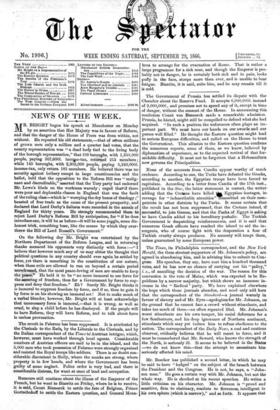The Times, its Philadelphia correspondent, and the New York Herald,
the three stoutest supporters of Mr. Johnson's policy, are agreed in abandoning him, and in advising him to submit to Con- gress. His speeches, they say, have cost him a hundred thousand votes, and he has now uo chance of carrying out his "policy," 1. e., of annulling the decision of the war. The reason for this conversion is the vote of Maine, which was expected to be Re- publican by a narrow majority, but which shows an immense in- crease in the " Radical " party. We have explained elsewhere' the hope which these journals abandon, and need only add here that the correspondent of the Standard—a journal warmly in favour of slavery and of Mr. Eyre—apologizes for Mr. Johnson, on the ground that he cannot face a crowd without stimulants, and takes too much of them—an often repeated libel. Mr. Johnson's- worst stimulants are his own temper, his social deference for a few Southerners, and his deep ignorance of Northern sentiment, stimulants which may yet induce him to refuse obedience to the nation. The correspondent of the Daily News, a cool and cautious observer, evidently believes that he will resort to force, and it must be remembered that Mr. Seward, who knows the strength of the North, is seriously ill. It seems to be believed in the States —we do not know this—that the attempt to assassinate him seriously affected his mind.






























